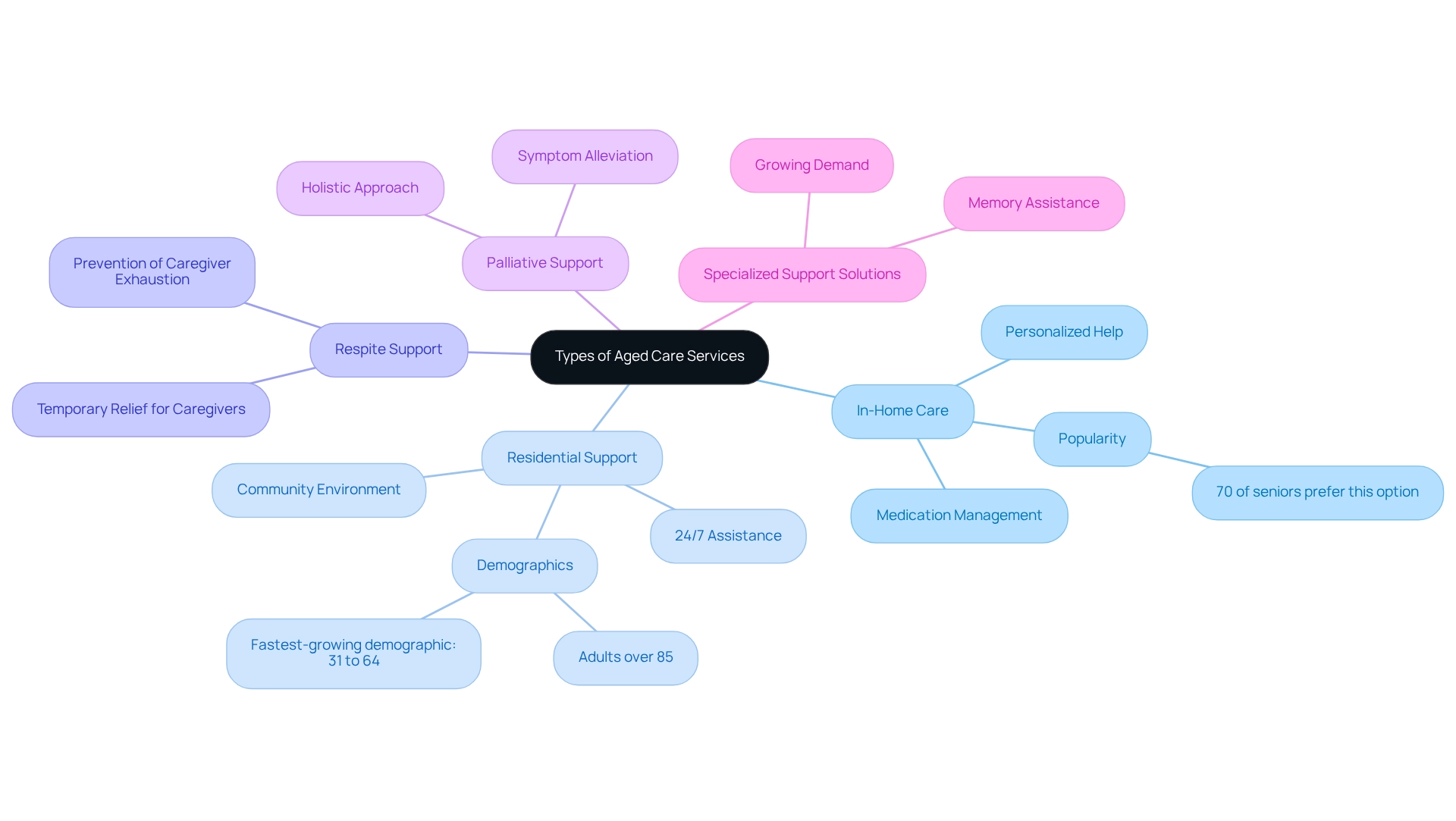Overview
Aged care is vital, as it provides essential support services for older individuals, enhancing their quality of life and alleviating the burden on their families. Understanding the various types of aged care services, associated costs, and financial planning strategies is crucial for families. These factors ensure that your loved ones receive the appropriate care they deserve as they age.
We understand that navigating the world of aged care can be overwhelming. It’s important to acknowledge your feelings and concerns during this journey. By exploring the available options, you can find the best solutions that cater to your family’s needs.
In addition, consider the peace of mind that comes with knowing your loved ones are well cared for. The right aged care services can significantly improve their daily lives, allowing them to enjoy their golden years with dignity and respect.
As you think about these decisions, remember that we’re here for you. Your comfort is our priority, and we encourage you to reach out for guidance. Together, we can ensure that your family members receive the compassionate care they need and deserve.
Introduction
As our loved ones age, the importance of aged care services becomes increasingly clear, acting as a vital lifeline for seniors who need assistance with daily living. Aged care includes a wide array of support options, from in-home care that helps individuals maintain their independence to residential facilities offering comprehensive assistance. This article explores the various types of aged care services available, highlighting their significance in enhancing the quality of life for older adults and alleviating the emotional and financial burdens on families.
With the rising costs and diverse needs associated with aging, understanding the landscape of aged care is crucial for families. We want to empower you to make informed decisions that will benefit your loved ones during their golden years. Remember, we’re here for you, and your comfort is our priority.
Define Aged Care and Its Importance
Aged care encompasses a spectrum of support and services tailored for older individuals who face challenges in daily activities due to aging. This includes personal assistance, nursing, and companionship, all aimed at improving the well-being and independence of seniors. The importance of aged care is profound; it not only helps individuals maintain their quality of life but also alleviates the emotional and physical strain on their loved ones.
By offering suitable support, aged care organizations create a nurturing atmosphere that respects the dignity and independence of seniors.
Statistics highlight the necessity of these programs: by 2050, the anticipated median yearly expense for a private nursing home room is expected to reach $255,463, assuming a 3% inflation rate. This underscores the financial implications of aging and the need for effective support solutions, making it essential for families to consider elderly support options early on. Moreover, research shows that individuals aged 65 and above typically require aged care assistance for about three years, with women residing in aged care facilities for an average of 3.7 years and men for 2.2 years. This highlights the necessity for families to plan for their loved ones’ potential long-term support needs.
Practical examples demonstrate how aged care can greatly enhance the quality of life for older adults. For instance, Best Care Nurses Registry has built a solid reputation for providing individualized assistance through private duty RNs and LPNs, allowing seniors to retain their independence while receiving the support they require. Their offerings specifically address the unique challenges faced by seniors, ensuring that clients receive compassionate support tailored to their personal needs.
This commitment to high-quality assistance has established Best Care as a trusted option for families in South Florida.
Expert insights further emphasize the significance of elderly support options. As noted by professionals in the field, effective aged care not only enriches the lives of seniors but also provides peace of mind for families, allowing them to focus on their personal lives while ensuring their loved ones are well cared for. In 2025, the importance of aged care support systems will continue to grow, making it crucial for families to understand their options and the benefits they provide.
Additionally, as many assisted living facilities are located in the Southeast U.S., families in South Florida have access to a variety of elderly support options that can meet their needs.
Explore Types of Aged Care Services
Aged care encompasses a variety of offerings tailored to meet the diverse needs of seniors. These services can be categorized as follows:
- In-Home Care: This option allows seniors to receive assistance in the comfort of their own homes. Providers deliver personalized help, companionship, and support with daily tasks such as meal preparation and medication management. With Best Care Nurses Registry, you can feel assured knowing that your loved one is safe and happy in the hands of skilled experts. Approximately 70% of seniors prefer in-home support services, underscoring its popularity and effectiveness in maintaining independence. This trend addresses safety, convenience, and emotional support for both seniors and their families. Without professional aged care, seniors may face health decline, poor nutrition, hygiene issues, mobility challenges, social isolation, household hazards, and medication mismanagement.
- Residential Support: For individuals who can no longer live independently, residential support facilities provide 24/7 assistance, including nursing services and social activities. These facilities cultivate a community environment, which is crucial for emotional well-being. Adults over 85 represent the largest demographic in aged care facilities, highlighting the necessity for comprehensive support in later life. Notably, individuals aged 31 to 64 are the fastest-growing demographic in nursing facilities, indicating a shift in the age profile of long-term residents.
- Respite Support: This temporary service offers relief for primary caregivers, allowing them to take a much-needed break while ensuring their loved ones receive quality assistance. Respite support is vital for preventing caregiver exhaustion, which can significantly impact the well-being of both the provider and the recipient. With Best Care Nurses Registry, families can explore flexible respite support options tailored to their unique needs, ensuring peace of mind and emotional comfort.
- Palliative Support: Focused on alleviating the symptoms and stress associated with serious illnesses, palliative support aims to enhance the quality of life for both patients and their families. This type of support is increasingly recognized for its holistic approach, addressing physical, emotional, and spiritual needs.
- Specialized Support Solutions: These offerings include memory assistance for individuals with dementia or Alzheimer’s disease, providing customized help for those facing specific health challenges. As the senior population grows, the demand for specialized aged care assistance continues to rise, highlighting the need for facilities capable of catering to these unique requirements. Understanding the various categories of specialized assistance available is essential for families seeking the best options for their loved ones.
Recognizing these types of elderly support options is crucial for families as they navigate the choices available for their loved ones. By selecting the appropriate type of assistance, families can ensure that their seniors receive the support they need to maintain their quality of life. The senior support market is segmented into options like adult day programs, home assistance, and institutional support, which can aid families in making informed decisions.
For more information or to schedule a consultation, contact Best Care Nurses Registry today.

Understand Financial Aspects of Aged Care
Comprehending the financial elements of aged care is crucial for families seeking support for their loved ones. It’s understandable to feel overwhelmed by these considerations. Here are some critical aspects to keep in mind:
- Cost of Services: The expenses for aged care support services can vary significantly based on the type of assistance needed. In-home assistance generally ranges from $24 to $43 per hour, while residential services may entail monthly charges that fluctuate based on the facility and the level of support offered. For example, live-in assistance can cost between $250 and $350 daily, underscoring the importance of budgeting for these costs.
- Insurance and Funding Options: Many families rely on long-term support insurance, Medicaid, or Medicare to help offset costs. Understanding the eligibility criteria and benefits of these programs is essential for maximizing financial support. It’s important to note that Medicaid coverage for assisted living varies by state, and while nursing support and personal aid may be included, room and board are typically not financed.
- Out-of-Pocket Costs: Families should prepare for out-of-pocket expenses, including co-pays for treatments that insurance may not fully cover. It’s also vital to consider costs related to maintaining a safe and active living environment, as these can significantly impact overall financial planning. Proactive financial planning can help reduce the risk of unforeseen expenses, ensuring households are better equipped to meet their loved ones’ support requirements.
- Financial Assistance Programs: Numerous state and federal initiatives offer financial support for elderly services. In Florida, for instance, programs like the Statewide Medicaid Managed Care Long-Term Support program and the Home and Community-Based Services Waiver can provide valuable resources for families navigating the financial landscape of elderly care. Additionally, the Best Care Concierge Program can assist with legal and financial matters through its network of trusted professionals, including financial advisors, guardians, and case managers, ensuring families have access to comprehensive support and flexible caregiver replacement options.
- Budgeting for Aged Care: Creating a detailed budget that encompasses all potential expenses related to elderly support is essential. This includes not only direct support costs but also expenses associated with maintaining a safe and active living environment. Financial advisors emphasize the importance of anticipating potential increases in assisted living costs over time, reminding us, “It’s also important to anticipate potential increases in assisted living costs over time.” This foresight can significantly impact long-term financial planning.
By understanding these financial elements, families can make informed choices that align with their financial capabilities while ensuring their loved ones receive the essential support and assistance they need. Planning ahead for evolving care needs, as highlighted in the case study “Preparing for Future Care Needs,” can help families allocate funds effectively for future expenses. Remember, we’re here for you every step of the way.
Conclusion
Aged care is vital for seniors, providing essential services that cater to their diverse needs. From in-home care that fosters independence to residential facilities offering comprehensive support, these services significantly enhance the quality of life for older adults while easing the emotional and financial burdens on their families.
It’s crucial for families to understand the various types of aged care services available, including:
- In-home care
- Residential aged care
- Respite care
- Palliative care
- Specialized services
Each option offers tailored benefits, ensuring that seniors receive the appropriate support for their unique challenges.
Furthermore, financial planning is another key aspect of managing aged care. Costs can vary widely, making it essential for families to explore:
- Insurance options
- Out-of-pocket expenses
- Available financial assistance programs
Proactive budgeting can help families avoid unexpected costs and ensure that their loved ones receive the necessary care without undue financial stress.
In summary, navigating the world of aged care requires informed decision-making and careful planning. By understanding the available services and preparing for associated costs, families can provide compassionate and effective care for their loved ones. This commitment not only enhances seniors’ well-being but also offers families peace of mind, making the aging process a more manageable and fulfilling journey.
Frequently Asked Questions
What is aged care?
Aged care encompasses a spectrum of support and services tailored for older individuals who face challenges in daily activities due to aging, including personal assistance, nursing, and companionship.
Why is aged care important?
Aged care is important as it helps individuals maintain their quality of life and alleviates the emotional and physical strain on their loved ones.
How do aged care organizations support seniors?
Aged care organizations create a nurturing atmosphere that respects the dignity and independence of seniors by offering suitable support.
What are the financial implications of aged care?
By 2050, the anticipated median yearly expense for a private nursing home room is expected to reach $255,463, highlighting the financial implications of aging and the need for effective support solutions.
How long do individuals typically require aged care assistance?
Individuals aged 65 and above typically require aged care assistance for about three years, with women residing in aged care facilities for an average of 3.7 years and men for 2.2 years.
Can you provide an example of effective aged care support?
Best Care Nurses Registry provides individualized assistance through private duty RNs and LPNs, allowing seniors to retain their independence while receiving the necessary support tailored to their personal needs.
What benefits does effective aged care provide for families?
Effective aged care enriches the lives of seniors and provides peace of mind for families, allowing them to focus on their personal lives while ensuring their loved ones are well cared for.
What is the future outlook for aged care support systems?
The importance of aged care support systems will continue to grow, making it crucial for families to understand their options and the benefits they provide, especially as many assisted living facilities are located in the Southeast U.S.











